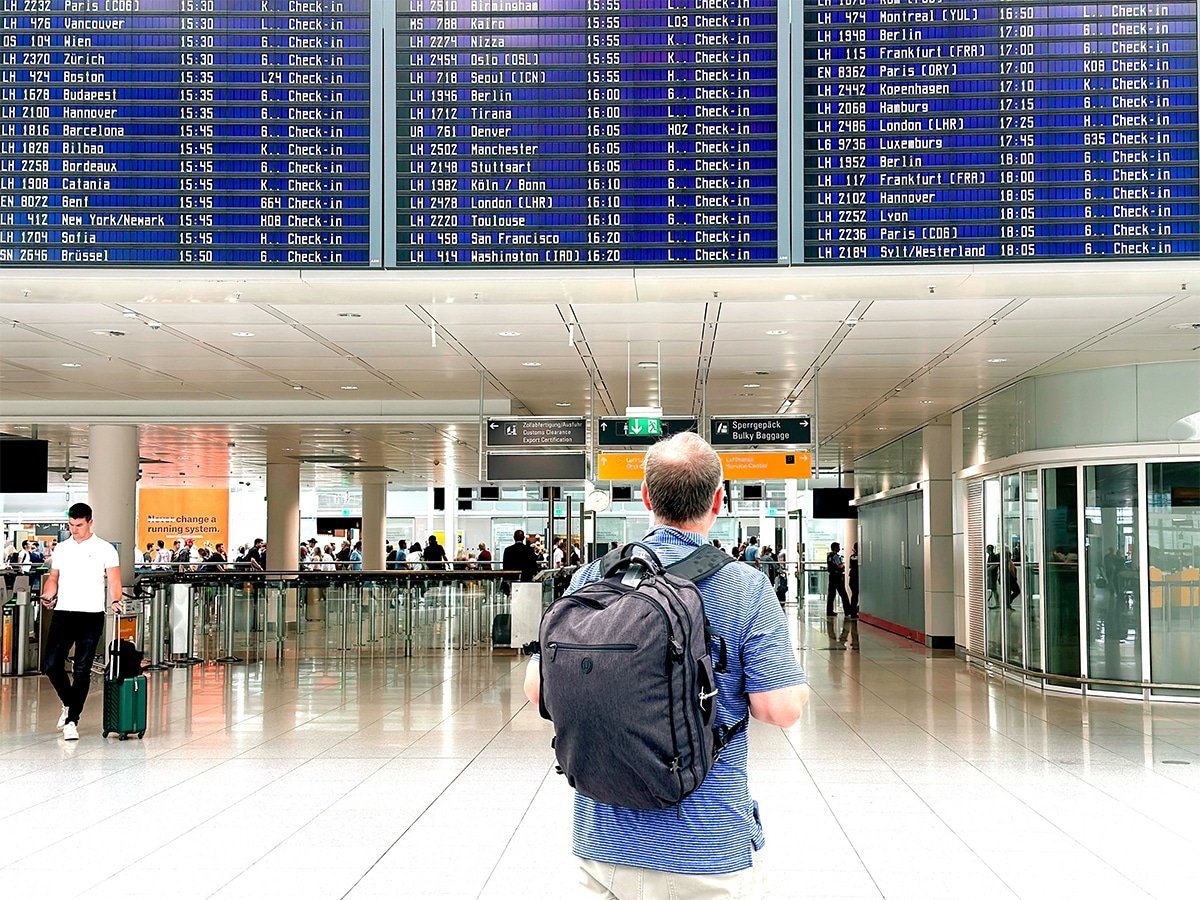This post contains references to products from one or more of our advertisers. We may receive compensation when you click on links to those products. For an explanation of our Advertising Disclosure, visit this page.
Are you rethinking how you shop and pay for purchases during the novel coronavirus outbreak? You may prefer paying with a credit card to earn rewards points under ordinary circumstances. Paying with plastic during these uncertain times can help you stay safe shopping by preventing germ spread and help you qualify for purchase protection benefits.
Coronavirus and Safe Shopping
There are other ways to stay safe in addition to maintaining 6-feet of separation and avoiding mass gatherings. However, there are still a few things that you may have to do such as buy food and other essentials with cash or plastic. These practices can protect your wallet and health.
Avoid Handing Cash to the Cashier
Novel coronavirus can spread from hand-to-hand contact. A recent study shows coronavirus can live on plastic and metal services for up to 3 days. A cashier may be handling cash and other items that carry germs. Most large stores let you insert your credit card EMV chip into a self-pay kiosk.
As most credit card companies no longer require signatures for purchases, you don’t have to worry about who held the pen before you. But you may still tap the button or screen to choose between credit and debit or to enter a pin.
Use Contactless Payments and Digital Wallets
Being able to “dip the chip” minimizes public contact. But, you’re still touching a card reader that many other customers touch. An increasing number of stores are offering contactless payments. If your card has an “echo wave” on the card, you can pay by hovering your card above the reader.
Another contactless option is using a digital wallet like Apple Pay or Samsung Pay. You can hold your phone over the card reader to pay for your purchase.
Shop Online and Avoid Crowds
As more stores temporarily close to encourage “social distancing,” online shopping is a valuable resource. You get the items sent directly to your front door and stay safe shopping online instead of in the store.
In addition to the normal purchase rewards, you can use an online shopping portal to get extra cash rewards. Some rewards platforms, like Rakuten, offer cashback at most national retailers.
Airline and hotel loyalty programs have similar shopping portals. Instead of getting cash rewards, you earn bonus points. As your spring travel plans are most likely on hold, this is an effortless way to earn airline miles without traveling.
You may also find that some merchants have a difficult time accepting debit purchases. Paying with a credit card gives you the assurance that your purchase goes through the first time.
Purchase Protection Benefits
Credit cards offer purchase protection benefits that can help you get a refund if the merchant won’t issue one.
Each bank and credit card has different levels of purchase protection benefits. If a merchant doesn’t deliver the product or it arrives in inoperable order, you will need to file a dispute within 60 days of the original purchase date. The same timeline goes for billing errors when the merchant won’t correct the order amount.
If an item gets damaged or stolen, you have up to 120 days to file a dispute. Not all items or reasons for loss qualify for a refund. These benefits can help provide some financial relief. Having this protection can be extra beneficial for coronavirus and safe shopping practices.
Travel Protection Benefits
Coronavirus is leaving an unprecedented toll on personal and business travel plans. You must first contact the travel provider to request a refund.
Many hotels are already offering refunds on most new non-refundable reservations. Airlines are also waiving the change fees for flights you book this spring.
If the travel provider won’t issue a purchase credit or refund, your credit card benefits might help you.
For example, you might get a refund for non-refundable travel when you or a family member experience sickness or a medical quarantine.
What Credit Card Travel Insurance Doesn’t Cover
Credit card travel insurance doesn’t cover every cancellation event. Each credit card issuer has different policies of what qualifies and what doesn’t. Chase and American Express tend to have the most generous benefits. Citi removed most travel protection benefits in 2019.
With certain Chase credit cards, those benefits may be void if you travel against the advice of a physician. You also won’t get a refund from the credit card company if the airline goes bankrupt.
If your credit card company doesn’t specifically say they won’t issue a refund in the benefits guide, it might be worth the time to submit a claim. They may review claims on a case-by-case basis. After all, you have nothing to lose but your time if you have a valid case.
Fraud Protection Benefits
Like any natural disaster or unexpected event, there will likely be coronavirus scams. Maybe you make purchases from fake merchants or downloading malicious software stealing your information.
Coronavirus or not, there’s always the risk of data breaches. Hackers break into retail’s secure servers and steal swathes of credit card numbers and go on a spending spree. A credit card can be your best payment option for online purchases (and in-store purchases) for the purchase protection benefits.
If there are fraudulent credit card purchases, you don’t have to worry about these purchases draining your bank account like a debit card.
Be sure to report these purchases immediately to close your account and receive reimbursement. You may be liable for up to $50 in fraudulent purchases if you don’t contact your bank as soon as you discover the activity. However, most credit cards offer $0 liability on unauthorized charges, meaning you are unlikely to pay this fee when you report the purchases before paying your statement balance.
With a debit card, the cash from the fraudulent purchases may not redeposit into your account until the investigation closes.
Virtual Card Numbers
Capital One and Citi offer virtual card numbers that add an extra layer of security to stay safe shopping online. You can use a virtual number that’s different than the number on your physical credit card.
If a thief steals your virtual card information, you can close that digital account without impacting your physical card account. If you have ever had a card lost, stolen, or compromised, waiting a week for the bank to mail you a replacement card is annoying. Plus, you have to update all your auto-pay accounts with the new card information.
Consider Introductory 0% APR Offers
If you’re temporarily laid off or receiving an irregular income until coronavirus dissipates, you may reduce your normal spending to match your new monthly income. But for those essential purchases you need to make until things return to normal, you might get a 0% introductory APR credit card.
Summary of Coronavirus and Safe Shopping
While the coronavirus outbreak is temporary, you should always practice these habits to stay safe shopping. Reducing your shopping trips reduces your exposure to potential contagion. Monitoring your card information for fraud can give you peace of mind in addition to avoiding unnecessary public exposure.
FAQs
What is a virtual card number?
A virtual credit card number is a digital spending account linked to your physical credit card. Instead of typing in the card number you use for in-person purchases, you can use the virtual number. If this virtual number incurs fraudulent purchases, you don’t need to replace your primary card account.
Capital One and Citi are two banks to offer virtual cards. You will need to install a browser extension or mobile app to pay with this add-on account. This service is free.
Are contactless payments safe?
Contactless credit card payments have the same purchase protection benefits as using the EMV chip or paying online. They can be more convenient as some credit card chip readers have difficulty reading the card.
From a health perspective, contactless payments can mean you don’t have to touch the card reading machine. As the novel coronavirus can remain on surfaces for up to 3 days, contactless payments limit virus spread.
What’s the safest way to shop online?
When shopping online, only make purchases from websites you trust. Some of the best examples are Amazon, eBay, Walmart, Target, and Nike. These brands are household names. While their sites are not hack-proof, you know you will receive your items during the standard shipping period.
For all online purchases, consider paying with a credit card. A credit card has fraud protection and purchase protection benefits to get a refund for bad or unauthorized purchases. If a fraudulent purchase happens with a debit card, those funds come directly from your checking account to cover the purchase. You may not get those funds back until the bank approves your dispute.
You should also practice these safety tips to protect your personal data:
- Use a VPN when on a public WiFi network
- Create strong passwords
- Use different passwords for each shopping platform
- Only shop from sites with an “https://” URL
- Verify the store’s email address before clicking on a message link
- Don’t provide personal information like your Social Security number






